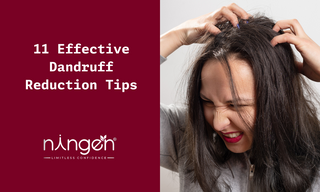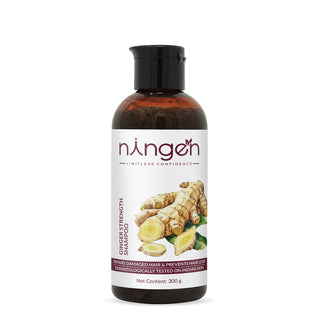Dealing with dandruff can be frustrating and often embarrassing for those affected. Common symptoms include white or yellow flakes on the scalp, an itchy scalp, and redness or irritation of the skin. In some cases, it may signify underlying medical conditions such as seborrheic dermatitis, psoriasis, or eczema, which can exacerbate dandruff. Fortunately, there are 11 Effective Dandruff Reduction Tips to help you manage and prevent this common issue effectively. Whether it’s due to dry skin, skin conditions, or other factors, these strategies can guide you in keeping your scalp healthy and flake-free. Treatment options, such as medicated shampoos containing ingredients like salicylic acid, ketoconazole, or zinc pyrithione, can also play a crucial role in controlling dandruff. By incorporating these approaches and understanding the root causes of dandruff, individuals can regain their confidence and maintain a healthier scalp.
In This Article;
- 1: Choose the Right Shampoo
- 2: Wash Your Hair Regularly
- 3: Condition Smartly
- 4: Scalp Exfoliation
- 5: Stay Hydrated
- 6: Healthy Diet
- 7: Manage Stress
- 8: Limit Hair Products
- 9: Use Tea Tree Oil
- 10: Embrace Natural
- 11: Consult a Dermatologist
- Conclusion
- Quick View
- Frequently Asked Questions (FAQs)
1. Choose the Right Shampoo
Using a specialized anti-dandruff shampoo is one of the most effective initial steps in managing dandruff flakes. It's essential to choose a shampoo that contains key active ingredients known to address the underlying causes of dandruff. Look for formulations that include zinc pyrithione, ketoconazole, or selenium sulfide, as these ingredients are specifically designed to fight the bacteria and fungi that can contribute to dandruff. By following these Effective Dandruff Reduction Tips and regularly incorporating these shampoos into your cleansing routine, you can lead to significant improvements in scalp health and achieve a flake-free appearance.
2. Wash Your Hair Regularly
Regular washing of your hair is crucial in the battle against dandruff, as it helps eliminate excess oil and dead skin cells that can contribute to the formation of flakes. Depending on your hair type and scalp condition, aim to wash your hair 2-3 times a week to maintain a healthy scalp environment. For those with naturally oily hair, more frequent washing may be necessary to manage oil levels effectively. Conversely, individuals with dry or curly hair may find that washing less often helps preserve natural moisture and prevent irritation. The key is finding the right washing routine that suits your specific hair and scalp needs while promoting overall scalp health. Incorporate this habit as part of your Effective Dandruff Reduction Tips for optimal results.
3. Condition Smartly
Don’t skip out on the conditioner! Applying a lightweight conditioner to the ends of your hair is essential for maintaining hair moisture. This practice helps to keep your hair hydrated and nourished while preventing an overload of heavy products on your scalp. By focusing on the ends, you can avoid weighing down your roots, which is particularly important for those susceptible to dandruff. A well-conditioned hair strand enhances overall hair manageability and contributes to a healthier scalp environment, reducing the chances of flake formation.
4. Scalp Exfoliation
Just as exfoliating your skin is essential for removing dead skin cells, your scalp can significantly benefit from gentle exfoliation as well. Scalp exfoliation is one of the Effective Dandruff Reduction Tips that helps eliminate product build-up and dead skin, which can contribute to dandruff and an unhealthy scalp environment. To effectively exfoliate your scalp, look for specialized scalp scrubs that are formulated to cleanse and detoxify. Alternatively, you can consider natural options, such as a mixture of sugar and olive oil, to create a gentle yet effective exfoliating treatment. This approach not only helps to clear away flakes but also promotes circulation and a fresh, clean scalp. Integrating scalp exfoliation into your routine can be a game-changer for dandruff prevention.
5. Stay Hydrated
Drinking enough water is crucial for maintaining overall skin and scalp health. Adequate hydration helps keep your scalp moisturized from the inside out, reducing the likelihood of dryness, flakiness, and irritation that can contribute to dandruff. As part of your Effective Dandruff Reduction Tips, aim to drink at least eight glasses of water each day to achieve optimal skin and scalp health. Proper hydration not only supports your scalp but also enhances the overall condition of your hair, making it look vibrant and healthy. Remember, a well-hydrated body is key in the battle against dandruff!
6. Healthy Diet
Incorporate a balanced diet that is rich in essential vitamins and minerals, with a particular focus on zinc and B vitamins, as these nutrients are well-known for their positive impact on skin health. Foods such as spinach, nuts, fish, and whole grains are excellent options to include in your diet. By ensuring you consume a variety of these nutrient-dense foods, you can support not only the overall health of your skin but also help in reducing the occurrence of dandruff.
7. Manage Stress
Stress is a significant factor that can worsen dandruff, making it imperative to integrate stress-relief practices into your daily routine as part of your Effective Dandruff Reduction Tips. Engaging in activities such as meditation, yoga, or even simple deep-breathing exercises can be beneficial. These practices not only promote relaxation but also help to balance your body's responses to stress, which in turn can lead to a healthier scalp. By managing stress effectively, you may reduce the likelihood of dandruff flare-ups and support overall scalp health.
8. Limit Hair Products
Overusing styling products can significantly contribute to scalp irritation and build-up, which can exacerbate dandruff. Products such as gels, hairsprays, and heavy creams can leave residues on the scalp that trap dirt and oil, leading to clogged pores and inflammation. To maintain a clean and healthy scalp, it’s essential to limit the use of these hair products. Instead, opt for lighter alternatives and give your scalp a break whenever possible. By reducing product usage, you can help ensure your scalp remains clear and less prone to dandruff formation.
9. Use Tea Tree Oil
Tea tree oil is renowned for its antifungal properties, making it a highly effective remedy for dandruff. To utilize this natural treatment as part of your Effective Dandruff Reduction Tips, mix a few drops of tea tree oil with a carrier oil, such as coconut oil or olive oil. Gently massage the mixture into your scalp, paying particular attention to areas prone to flaking. Allow the oil to sit for at least 30 minutes before washing your hair with a mild shampoo. This process not only helps combat the fungal agents associated with dandruff but also nourishes your scalp, promoting overall scalp health. Incorporating tea tree oil into your scalp care routine can significantly improve your dandruff condition over time.
10. Embrace Natural
Aloe vera, coconut oil, and apple cider vinegar are excellent natural remedies that can provide soothing relief for your scalp. Each of these ingredients possesses unique properties that contribute to creating a balanced scalp environment, helping to reduce the occurrence of flakes associated with dandruff.
- Aloe Vera: Known for its calming and moisturizing effects, aloe vera can hydrate the scalp and alleviate irritation. Its anti-inflammatory properties can help reduce redness and discomfort, making it a great choice for those dealing with dandruff.
- Coconut Oil: This nutrient-rich oil is known for its antifungal properties and ability to deeply moisturize the scalp. By applying coconut oil, you can soothe dryness and combat flaking, which may help diminish dandruff symptoms.
- Apple Cider Vinegar: With its natural acidity, apple cider vinegar can help restore the pH balance of the scalp. This equilibrium can inhibit the growth of dandruff-causing fungi, while its astringent properties can effectively remove product buildup and excess oil, leading to a cleaner, healthier scalp.
Incorporating these natural remedies into your hair care routine can greatly enhance scalp health and significantly reduce flakes associated with dandruff.
11. Consult a Dermatologist
If you find that dandruff persists despite your best efforts to manage it, it may be beneficial to consult a dermatologist. A dermatologist is a skin care specialist who can assess your scalp and identify any underlying medical conditions that could be contributing to your dandruff. Common conditions such as seborrheic dermatitis or psoriasis can lead to persistent dandruff and may require a tailored treatment plan. By seeking professional advice, you can receive targeted solutions and recommendations that address not only the symptoms but also the root causes of your dandruff, leading to more effective prevention and management, ultimately aligning with Most Effective Dandruff Reduction Tips.
Conclusion
In Conclusion, by incorporating these Effective Dandruff Reduction Tips into your regular hair care routine, you can significantly reduce the prevalence of dandruff and prevent its return, all while enjoying a healthy, vibrant, and flake-free scalp. Remember that it’s crucial to practice patience and maintain consistency in your approach, as it might take some time before you start noticing substantial improvements in your scalp condition.
Additionally, it’s important to listen closely to your scalp and make adjustments according to its changing needs, especially if you're experiencing common dandruff symptoms such as flaking, itching, or redness. Integrating active ingredients like zinc pyrithione, salicylic acid, tea tree oil, or ketoconazole into your hair care routine can help target these symptoms effectively. Adopting a proactive approach will not only assist you in effectively managing dandruff but can also enhance your overall hair health and appearance, ultimately boosting your confidence in the way you look. With this diligent effort and commitment, you'll be on the path to a healthier scalp and more beautiful hair.
Quick View
To effectively prevent and manage dandruff, it is essential to adopt these 11 Effective Dandruff Reduction Tips: maintain a consistent washing routine using products that are appropriate for your hair type, transition to a well-balanced and nutritious diet, minimize stress levels in your life, and ensure that you stay adequately hydrated.
Be sure to avoid harsh chemicals that can irritate your scalp and potentially contribute to hair loss. Make it a habit to regularly clean your hair tools like brushes and combs. Incorporating gentle massages of your scalp into your washing routine can enhance blood circulation, supporting healthy hair growth, while also being mindful to limit sun exposure to avoid over-drying your scalp.
Additionally, remember to change your pillowcases at least once a week to reduce oil and skin cell buildup. Consider products that are aloe-based for their hydrating properties, and if dandruff issues continue to trouble you, do not hesitate to consult with a dermatologist for expert advice. Above all, remain consistent with your hair care regimen to achieve lasting results. By closely following these effective guidelines, you can work towards attaining a healthier, flake-free scalp and ultimately enhance your self-confidence in the appearance of your hair.
Frequently Asked Questions (FAQs)
1. What Causes Dandruff?
Dandruff can be triggered by a variety of factors, including dry skin, seborrheic dermatitis, sensitivity to hair care products, and fungal infections like Malassezia. Stress and hormonal changes can also contribute to flare-ups.
2. How Often Should I Wash My Hair to Prevent Dandruff?
The frequency of washing your hair can vary based on individual hair types and scalp conditions. For most people, washing every 2-3 days is sufficient. However, those with oily scalps may benefit from more frequent washing, while those with dry hair might opt for less frequent washes to maintain moisture levels.
3. Are There Specific Ingredients I Should Look for in Anti-Dandruff Shampoos?
Yes! Look for shampoos containing ingredients such as zinc pyrithione, ketoconazole, selenium sulfide, or salicylic acid. These ingredients help combat dandruff-causing fungi and reduce flakiness.
4. Can Diet Affect Dandruff?
Absolutely. A balanced diet rich in vitamins, minerals, and healthy fats can promote scalp health. Foods high in omega-3 fatty acids and antioxidants may help reduce inflammation and maintain skin hydration.
5. How Can Stress Impact Dandruff?
Stress can disrupt hormonal balances and affect overall skin health, leading to increased oil production or dryness on the scalp, both of which can exacerbate dandruff. Incorporating stress management techniques such as exercise, meditation, or hobbies can be beneficial.
6. Is Dandruff Contagious?
No, dandruff is not contagious. It is a common scalp condition and cannot be passed from one person to another.
7. How Long Should I Use Anti-Dandruff Products?
It’s essential to follow the instructions provided with your anti-dandruff products. Generally, you should use them consistently for several weeks to see significant improvements. If symptoms of dandruff persist after this period, consult a healthcare professional.
8. When Should I See a Doctor?
If you have persistent dandruff that doesn’t improve with over-the-counter products, or if you experience severe itching, redness, or inflammation, it's advisable to consult a dermatologist for a proper diagnosis and treatment plan.










